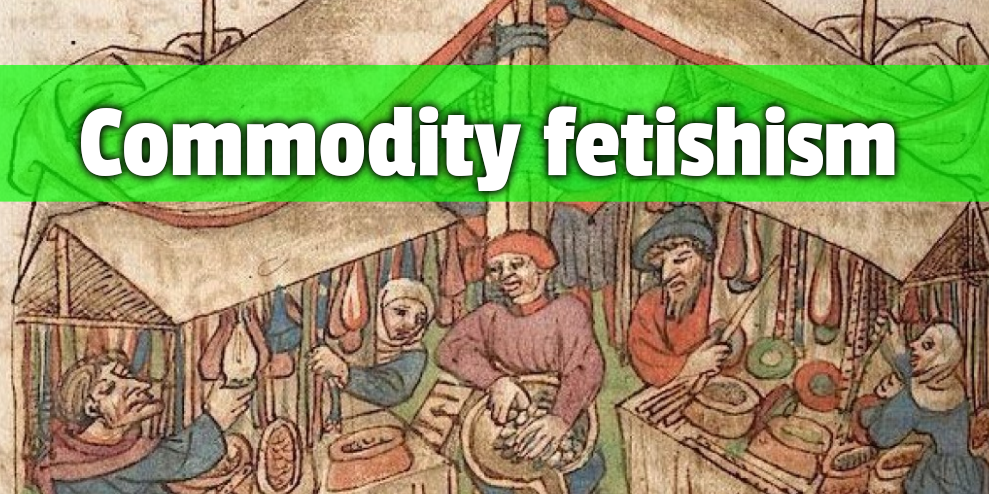Commodity fetishism

"Spontaneous" representation of the social relations of production, which bind people and classes, in the form of relations between equivalent commodities, i.e. relations between social objects equal in their exchange value.
Origins
Commodity exchange in the market is by definition an exchange of equivalents. Equivalents in exchange value, that is in abstract social work. Value, which is a social relationship between people organized in classes, then blurs its nature representing itself as a social relationship between things, between goods -be they tangible or intangible- that are found in the market.
Where, then, does the enigmatic character that distinguishes the product from labor come from as soon as it takes on the form of a commodity? Obviously, from that very form. The equality of human work takes the material form of the equal value of the products of labor; the measure of the expenditure of human labor power by its duration, takes the form of the magnitude of the value achieved by the products of labor; finally, the relations between producers, in which the social determinations of their work are made effective, take the form of a social relationship between the products of labor. The mystery of the mercantile form consists simply, then, in that it reflects before men the social character of their own work as objective features inherent in the products of work, as natural social properties of such things, and therefore, that it also reflects the social relationship between producers and global work, as a social relationship between objects, existing outside the producers. (…)
The commodity form and the relationship of value between the products of the work in which such form is represented have absolutely nothing to do with the physical nature of the same or with the relationships, proper to things, that are derived from such nature. What here adopts, for men, the phantasmagorical form of a relation between things, is only the determined social relation existing between them. Hence, in order to find a relevant analogy, we must look for shelter in the foggy regions of the religious world. In such a world the products of the human mind seem to be autonomous figures, endowed with their own life, in relation to each other and to men. The same happens in the world of commodities with the products of human labor. This is what I call the fetishism that adheres to the products of labor as soon as they are produced as commodities, and which is inseparable from mercantile production.
Karl Marx. Capital, 1857
Commodity fetishism as a specifically capitalist form of alienation
The fracture of the human community into classes with antagonistic interests meant the beginning of alienation: the human, the social, present themselves as alien to the human, flee to the skies of ideology to hold together in the fantasies of the intellect what is antagonistic in the material social world. Alienation is nothing more than the imaginary separation of the species from the very relations that define its social organization.
However, unlike the exploiting classes that preceded it, capitalist exploitation is completely "economic". The feudal lord took a piece of production and social work "by right" within the framework of a personal, concrete relationship with his servants. There is no fetishism in what is in reality nothing more than an extra-economic levy.
The natural form of work, its particularity, and not, as on the basis of the production of commodities, its generality, is what here constitutes the directly social form of it. Personal servile service is measured by time, just as it is with work that produces goods, but no servant is unaware that it is a certain amount of his personal labor power, spent by him in the service of his master. The tithe he gives to the priest is more transparent than the blessing of the clergyman. Whatever judgment we may have of the masks that men wear here in carrying out their respective roles, the fact is that the social relations existing among people in their work are revealed as their own personal relations and do not appear disguised as social relations among things, among the products of work.
Karl Marx. The Capital, 1857
The leap from concrete personal work to abstract social work in the relationship of exploitation, turns commodity fetishism into a qualitative leap in the process of abstraction proper to all forms of alienation. It is its specifically capitalist and completely abstract form. While slavers and feudal lords had to base their exploitation on the external will of the gods, the commodity itself makes social relations appear as relations between things, between social objects alien to those who produced them, in the same way that surplus value appears as a spontaneous result of human labor when it is sold as a commodity under the form of labor power.
http://dictionary.marxismo.school/Commodity fetishism